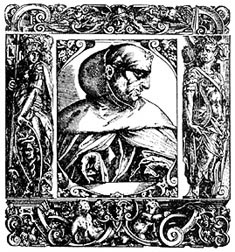 Albertus Magnus
Albertus Magnus
From Jovius’ Vitae Illustrium Virorum.
Albert de Groot was born about 1206 and died at the age of 74. It has been said of
him that he was "magnus in magia, major in philosophia, maximus in theologia."
He was a member of the Dominican order and the mentor of St. Thomas Aquinas in alchemy and
philosophy. Among other positions of dignity occupied by Albertus Magnus was that of
Bishop of Regensburg.
He was beatified in 1622. Albertus was an Aristotelian philosopher, an astrologer, and a
profound student of medicine and physics. During his youth, he was considered of deficient
mentality, but his sincere service and devotion were rewarded by a vision in which the
Virgin Mary appeared to him and bestowed upon him great philosophical and intellectual
powers. Having become master of the magical sciences, Albertus began the construction of a
curious automaton, which he invested with the powers of speech and thought. The Android,
as it was called, was composed of metals and unknown substances chosen according to the
stars and endowed with spiritual qualities by magical formulae and invocations, and the
labor upon it consumed over thirty years. St. Thomas Aquinas, thinking the device to be a
diabolical mechanism, destroyed it, thus frustrating the labor of a lifetime. In spite of
this act, Albertus Magnus left to St. Thomas Aquinas his alchemical formulae, including
(according to legend)the secret of the Philosopher’s Stone.
On one occasion Albertus Magnus invited William II, Count of Holland and King of the
Romans, to a garden party in midwinter. The ground was covered with snow, but Albertus had
prepared a sumptuous banquet in the open grounds of his monastery at Cologne. The guests
were amazed at the imprudence of the philosopher, but as they sat down to eat Albertus
uttered a few words, the snow disappeared, the garden was filled with flowers and singing
birds, and the air was warm with the breezes of summer. As soon as the feast was over, the
snow returned, much to the amazement of the assembled nobles. (For details, see The Lives
of Alchemystical Philosophers.) MPH